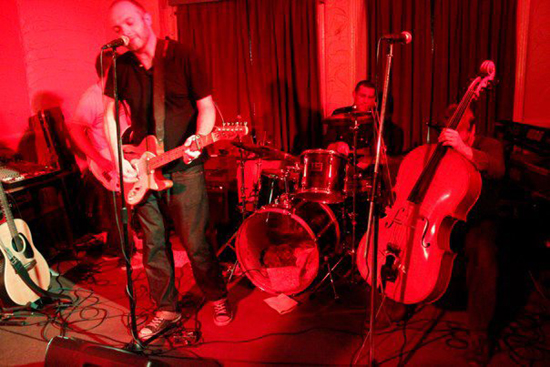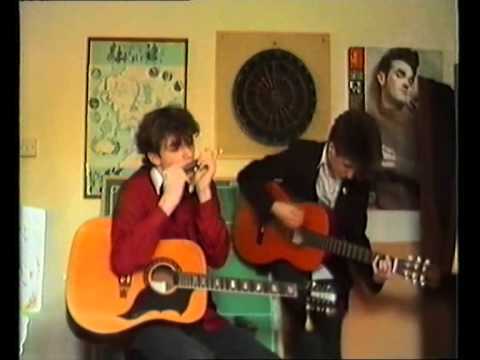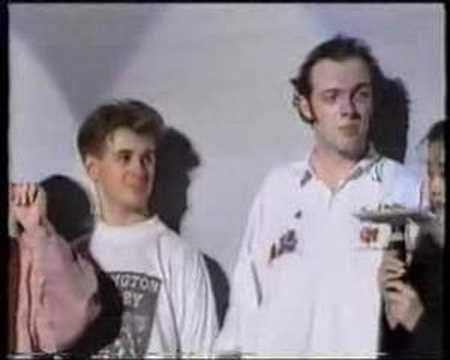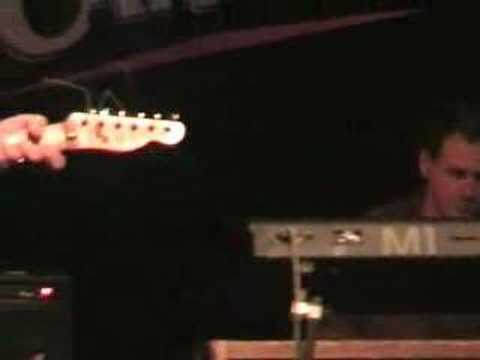Luke Haines arguably achieved his aim of the Auteurs becoming “an English equivalent to the Modern Lovers”. But another band have done the same but perhaps even more so, reaching a later-in-life peak with the release of last year’s Exactly album – Accrington Stanley.
In the late 80s they only impressed me live at the tail-end of their sets, once they’d built up a head of steam and thrashed away in a manner learned from VHS footage of the Violent Femmes onstage. They were far too shy, reserved and polite, musically and personally. "Another pure Peel treasure", said David Stubbs however, reviewing the first 100 in Peel’s online archive which featured their Fathom and Lovebound albums, "eccentric witty indie". To these ears they still sound like the Housemartins trying to be REM, albeit in a good way (if that’s possible). It came as a surprise, therefore, to find myself completely in love with their latest album, Exactly (and the previous one, 2007’s Valley Studio Sessions – both available on Spotify).
It is a collection of beautiful, wry, old-fashioned songs, touched by genius & naiveté, with a character lacking in most bands half their age working in a similar area. This low-key, no-budget band deserve a much bigger audience than they have now. So, here is an interview with possibly the smartest songwriter Southampton – home of Ken Russell, Benny Hill, Craig David, Band of Skulls – has ever produced. With musical debts maybe to early REM, prime Morrissey, Manfred Mann, the Violent Femmes, Wedding Present, Lloyd Cole and so on, their classicist tuneage frames lyricist Dan O’Farrell’s songs of mid-life exasperation and contemplation. But first…
A history of the band in YouTube clips…
Lip-syncing in 1987. Filmed on one camera in what looks like a student common room complete with obligatory Smiths poster, from which Morrissey looks down disdainfully. The digital judders caused by videotape transfer make it look like its being beamed in across time and space, which in a way it is. Features more harmonica than is strictly necessary.
Live at the Yoyogi Stadium, Tokyo 1992. Accrington Stanley play ‘James Stewart’ and ‘Trudy’ for 12,000 Japanese music lovers and the TV cameras at the Sumitomo One festival. Had this not been filmed the band would probably remember this, twenty one years on, as being a particularly vivid dream which they collectively had, or a very elaborate practical joke. It happened.
Onstage at the Joiners in Southampton, 2007. A great rendition of one of their best songs, 80s hip hop, 50s rock & roll, wherein the spirit of the Modern Lovers is channelled and sartorial elegance is revealed not to be the band’s strong point.
I don’t imagine that you made any actual money being such a low profile and modest cult band. Why do you persist, is ‘creative incontinence’ a good way to describe it?
Dan O’Farrell: I love the phrase ‘creative incontinence’. Yes, it’s an accurate diagnosis. We’ve made precisely no money, but always just enough to fund the next recording project without having to attempt a bank job. I do think about this a lot… there have been several moments when it would have been far easier to knock it on the head, retreat with our memories and dignity intact. But this is what we do. I’ve basically been in this band with Baz since I was 14, and with Rufus since I was 19. Whenever we don’t do anything for a while, we all get pretty miserable.
We hit one of those points just before we started recording Exactly – Alex (drums) had moved to mid-Wales and we didn’t know if we could face starting from scratch with someone new. We met up for a pint, looked a Stanley-less future in the face, and decided to keep writing, whatever else happened. Within a few weeks, most of the songs on Exactly had taken shape and we were suddenly on a roll again.
We’ve certainly had some low-points, but our (arguably delusional) faith in our own value meant that we always put these into the context of our inexorable rise. We kind of pride ourselves on playing the strangest gigs to the strangest crowds. It’s all ‘character building’, innit? Also, we think we’re getting better all the time. It’s probably safe to assume that major chart success will elude us, but we do have a fantasy of creating this fantastic body of work, which musicologists will re-discover in 2098. We’ll get our kudos then.
Knowing John Peel’s love of football, calling yourself Accrington Stanley was like a great, big flashing, neon sign saying “Over here Mr Peel!” Wasn’t it?
DO: We’ve never been that calculating, probably to our detriment. I wonder if it caught his eye for that reason though. We chose that name in early 1986 (we were F Yes Bubble before that, so it couldn’t get much worse) purely because I had this ace book called The History of Football and there was a picture of a football crowd watching an Accrington Stanley match in the 1930s which Baz and I thought would make a great poster. This was before that damned milk advert, and Accrington Stanley were only ever mentioned as a sad story from going bust in the 60s. It had the ring of the underdog about it. Now, it’s a bit of a pain, as it renders us very hard to Google or find on YouTube.
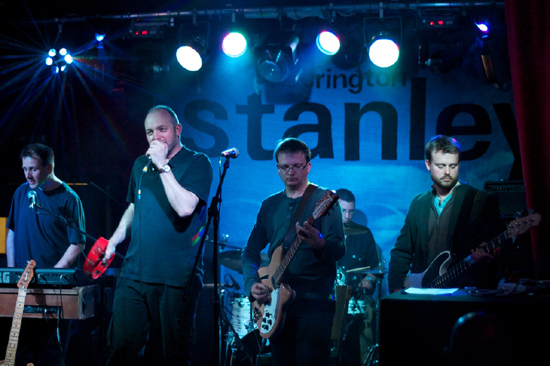
Does John Peel’s seal of approval actually mean anything anymore, in 2013? He liked countless bands after all.
DO: On a personal level, it made us feel good. I’d heard a rumour that he’d played us when we sent him Fathom, but I wasn’t sure if it was true. It was only a couple of years ago that I found out he’d played stuff off Lovebound too, thanks to the wonders of the internet and people posting playlists on the Peel wiki. It was brilliant to actually find an mp3 of the show where he played ‘Trudy’ and hear him actually say our name. As for the publicity that we managed to get last year, that was pure luck. If we’d have been called ‘Zeppo’s Xylophones’ we’d have been in the 26th instalment and no one would have noticed. Having two albums in the first 100 put on the web, alongside lots of bands that people had at least heard of, created a little curiosity and a chance to say, "Hey! That’s us! We’re still going!"
Programmes like Due South were happy to have us on because just about anyone over 30 working in TV or radio is, I think, inspired by (or perhaps envious of) the freedom and influence that John Peel enjoyed. They were itching to pay tribute to him. It’s probably the first stroke of luck we’ve had since 1992 (when we got chosen to go to Tokyo) and I’m glad that, for once, we were able to jump up and down a bit and wave our arms, politely. I feel a bit like we’ve been labouring away under a rock for 20 odd years and very occasionally someone lifts the rock up, admires the strange creatures zipping about, then drops the rock down again.
Does BBC Radio 6Music go any way to replacing Peel? Did you hear their listener-voted Top 100 Songs of the past 10 years?
DO: Anyone trying to replace Peel seems to be self-conscious about it. I haven’t heard anyone truly replicate his wilful eclecticism. I like 6Music as an idea, but it seems to be increasingly playing it safe a lot of the time. When they do embrace the fringes, it’s in a safely constructed hour. What was great about Peel was that you genuinely thought he liked the stuff he played; he wasn’t trying to be weird for the sake of it.
Your inspirations were bands like the Smiths and R.E.M. Am I right in thinking you much preferred the American take on indie – from Jonathan Richman, the Violent Femmes and so on rather than 14 Iced Bears and UK groups?
DO: I’d not really thought about it like that, but there’s truth in it. I’m talking more for myself here, as Baz has a hugely wider taste than I do, and Rufus comes from a really different musical background (classical, largely), but I just cherished those bands that seemed to ‘speak to me’ and hit the sweet-spots musically without caring too much where they came from. The Smiths hit me at exactly the right moment. I was 14 when I bought Hatful of Hollow and it was the greatest thing I’d ever heard. Early R.E.M. seemed to come from the same place, to me: a mysterious land where Rickenbacker guitars shimmered and sparkled and singers could say whatever they wanted without resorting to clichés. Before then, I’d been obsessed with Buddy Holly, Manfred Mann and Gene Vincent – my dad’s records. Jonathan Richman’s records have a beautiful innocence about them, which I love, and the Violent Femmes had the best way of making acoustic guitars sound violent. The Go-Betweens blew both Baz and me away.
There was something in the air in 1985, which seemed to produce these amazingly poetic, romantic records in every part of the world. By contrast, the C86 scene seemed a bit ‘style over substance’ to me. I was suspicious of all the Tallulah Gosh haircuts and annoyed by the ‘indie purist’ vibe of the people I knew who got into the whole indie anorak thing. (This is probably quite ironic, I know – I’m sure I annoyed them with my own set of indie values.) I went up to Manchester as a student in 1988 and what I loved about the clubs up there was that anything went, musically. You’d get indie merging into hip-hop into ‘Sympathy for the Devil’ into punk into whatever, all on the same night.
Nationally (and internationally) Southampton seems to be viewed as a cultural backwater. Maybe it’s just compared to Liverpool or Manchester. Are Accrington Stanley typical of bands from the city, ‘Under-achievers and proud’. Big Fish in A Small Pond?
DO: I think most people from Southampton feel that the city is unfairly ignored, particularly in music (but it works for football, too). I guess there’s never been a Southampton ‘sound’ or anything like that, but I get quite embittered about some of the bands/singers from round here who never got their ‘lucky break’. I guess our move to London was an attempt to play to more people, but we ended up taking residency in a pub in Kilburn and doing there exactly what we’d done in the Dorchester in Bevois Valley – playing every week and gradually winning people round to our own songs. I think we’ve always felt like underdogs – we’ve always seemed to be slightly out of step and never been ‘cool’ in an NME friendly way – but we’ve never wanted to under-achieve. We’ve always believed that we’re writing/recording potentially popular songs, and it’s only those bastards at the radio stations who are preventing our natural ascendancy by insisting on playing Madonna and Oasis all the time. We may have been, of course, occasionally deluded in this belief.
The songs on Exactly have some explicit references to your mid-life-crisis. Is this a conscious attempt to tap into a 40-something market?
DO: I didn’t really notice at the time of writing that the songs had a ‘mid-life’ crisis theme developing, and it certainly wasn’t a grab for a certain demographic! (I wish we were that well-organised and commercially savvy.) But, I’m 43 now and it would be stupid to write as if I were a skinny-jean wearing 18-year-old. A song like ‘BMI’ comes out of the sad thought that I’m no longer at the peak of physical beauty, but I hope it’s pretty funny in the way it addresses those concerns. Similarly, in ‘Mid-Life Crisis’, I’m hoping that the humour will undercut the despair. I love lyric-writing more than anything else I do, and when a set of words come together, gel with the music properly, say something hopefully interesting or fresh, I feel extremely happy for days. I’m pretty used to these songs being heard by very few people, sometimes no-one at all, so I don’t worry too much about people’s reactions. Maybe I should start!
You seem to have finally discovered electronica – samples and loops after a lifetime of jangly guitars.
DO: There’s always been a… no, there hasn’t. But Baz has been playing with loops and samples for years. He had a record deal offered to him at one point as Wesley Crusher, his techno alter-ego. The way we recorded Exactly, using laptops in spare-rooms with Alex lost in the wilds of Wales, meant that necessity became the mother of invention and Baz was able to use his loop-making skills on the songs we were writing. It gives them a fresh edge, I think, whilst still sounding like us. The challenge will be to keep some of that edge on the next recordings whilst bringing the physicality of Al’s live drums back into the equation…
Two questions rolled into one again; you’re 43, I’m 49 this year, does rock & roll, or whatever you want to call it, still belong to youth? The Accrington Stanley of 2012/13 with its acquired wisdom and experience; aren’t you just so much better than prematurely ‘old’ bands like Coldplay, Keane and Elbow?
DO: It’s tough mental hurdle, that one. I’m running out of good ‘late blooming’ role-models, but up until recently I used to remind myself that Ian Dury didn’t make an impact until he was good and ready. I think that the fact that no-one has paid us a blind bit of notice for 20 years has kept us bizarrely young. It’s like we’re still poised in the wings, waiting for our cue. I think we are improving with age, which helps. I think the moment you feel stuck in a rut with nothing new to excite you, is probably the moment to take up golf or hang-gliding. I guess I’ll also have to quote Jonathan Richman: "I’m about 17, I guess. Yeah, I know what the calendar says, but I just showed up here on the scene." I think he wrote that in his late thirties, and I’ve been singing it to myself since I was 17.

